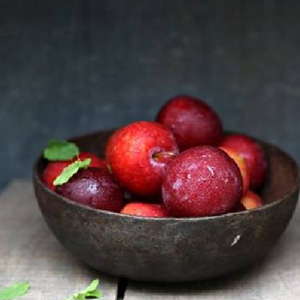Plums are a small stone fruit related to nectarines and peaches. They tend to have a sweet and tart taste, and you can eat them as is or use them in a variety of recipes, including plum wine, pickled plums and plum jam.
Plums are low in calories and offer several beneficial nutrients, so adding them to your diet can be beneficial.
Protect your heart:
One medium-sized fresh plum contains 113 mg of potassium, a mineral that helps manage high blood pressure and reduce the risk of strokes.
If that isn’t heart-warming enough, the reddish-blue pigment in some plums, which are called anthocyanins, may also protect against cancer by mopping up harmful free radicals.
Lower your blood sugar:
Plums rank low on the glycemic index, which means eating them can help you control your blood sugar and reduce the risk of Type 2 Diabetes.
Improve your memory:
Did you know that eating three to four antioxidant-rich prunes a day can help neutralize cell-damaging free radicals that affect your memory?
Now that’s sharp snacking!
Strengthen your bones:
Two plums contain about one tenth of your daily vitamin K, which helps maintain strong bones.
Researchers have found that low levels of vitamin K are associated with an increased incidence of osteoarthritis in hands and knees.
Stay regular:
Dried plums— prunes— are tried-and-tested for helping your bowel do its work (each prune has one gram of fibre).
Eat them as is or make a batch of softened prunes to keep in the fridge to have with granola and yogurt: Soak a few handfuls of prunes in freshly boiled water, cool and store in a covered jar in the fridge.
This healthy fruit report was brought to you by Stone Fruit Reports.

